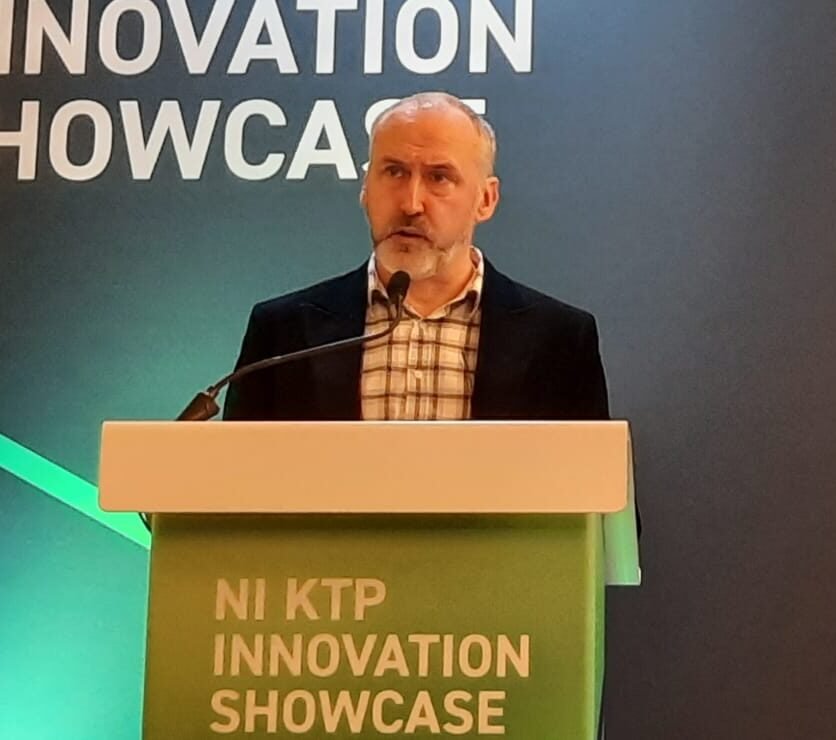
Upcoming Events

Creating Accessible Documents
Date & Time
Thursday 5th December, 2024
9:30 AM - 4:30 PM
Venue
Online
CPD Certified
Availability
4 Spaces left
Purchase
Overview
If you are responsible for creating any content whether that be producing documents, social media, or web content for your organisation, this course will give you a strong grounding to make the most accessible content possible. Documents are a great starting point for everyone to learn universal accessible content basics as well as getting to grips with the accessibility features of the most common tools including Office 365 programs and PDFs.
Our Creating Accessible Documents course gives you the knowledge to create highly accessible documents. If you are from the public sector, publishing accessible digital content including documents is now a legal requirement. You will learn how to make documents accessible using a host of different tools, and how to apply plain English principles to create easy to understand content.
Leave the day fully immersed in document accessibility with the confidence to ensure your documentation complies with the regulation and is accessible to all.
Learning Objectives
By the end of this training, delegates should have the knowledge and tools to:
Understand the legislation relating to accessible documents
Embed basic principles of accessible documents for the following platforms:
Word
PowerPoint
PDF
Email
Check documents for accessibility
Adopt technologies to help create accessible documents
Use accessible documents effectively
Lead Trainers
Ben Watson
Accessibility Consultant
All Able
George Rhodes
Accessibility Consultant
All Able
Agenda
9:30 am
Welcome And Clarification Of Learning Objectives
9:45 am
Session 1: An Introduction to Accessible Documents
How are documents covered in the legislation
Basic principles of creating accessible documents
Why documents are the core of accessible content design
Ben Watson
Accessibility Consultant
All Able
George Rhodes
Accessibility Consultant
All Able
11:00 am
Morning Break
11:10 am
Session 2: Checking For Accessibility
As part of the checking for accessibility session, attendees will be asked to suggest documents that we can review as a group. This can be done either in advance of the day or as the discussion unfolds.
· Understanding different document platforms
· Gain techniques for checking for accessibility
· Microsoft Accessibility Checker
· Live document walkthroughs
· Adobe Pro and making accessible PDFs.
Ben Watson
Accessibility Consultant
All Able
George Rhodes
Accessibility Consultant
All Able
12:30 pm
Lunch Break
1:00 pm
Session 3: Writing in Plain English (Part 1)
What is plain English?
Plain English and accessibility
How to write in plain English: core principles
Ben Watson
Accessibility Consultant
All Able
George Rhodes
Accessibility Consultant
All Able
2:00 pm
Session 4: Writing in Plain English (Part 2)
Group exercise: turning text into plain English
Exploring the benefit of plain English for your organisation
Plain English toolkit
Ben Watson
Accessibility Consultant
All Able
George Rhodes
Accessibility Consultant
All Able
2:50 pm
Afternoon Break
3:00 pm
Session 5: Using Technology for Accessible Documents
Technologies that can help create and use accessible documents
Creating accessible templates
Ben Watson
Accessibility Consultant
All Able
George Rhodes
Accessibility Consultant
All Able
3:30 pm
Session 6: Open Q&A
In this session you will have the opportunity to ask our experts all your accessibility questions, revisiting key sessions from the training and gaining key insights into how you can put what you’ve learned into practice.
Ben Watson
Accessibility Consultant
All Able
George Rhodes
Accessibility Consultant
All Able
4:30 pm
Training Close
*programme subject to change
Pricing
Public Sector
£345 + VAT
Private Sector
£445 + VAT

Ensuring Public Sector Website Accessibility and Compliance
Date & Time
Wednesday 27 November, 2024
09:30 AM - 16:30 PM
Venue
Online CPD Workshop
Availability
3 Spaces Left
Purchase
Overview
This one day course is for people new to accessibility and experienced alike. Improving digital accessibility in an organisation requires changes from many different areas of a business. It is not just about auditing for accessibility compliance, or making reasonable adjustments when there are requests. It is about building a consistent approach to make accessibility part of the core behaviours of an organisation in all areas. Whether that is during the procurement of new digital platforms, recruiting new members of staff, content writing and document production, including accessibility into policies and supporting all stakeholders in inclusive and proactive ways.
This event is focused on understanding the regulations, policy and how to cover all of the important management tasks to defend against legal challenges, along with embedding accessibility as a responsibility for all staff.
Learning Objectives
By the end of the workshop, delegates will gain:
An introduction to accessibility and how to begin persuading others to join in on accessible practices.
A better understanding of accessibility legislation in the UK and current applicable legislation including the public sector bodies accessibility regulations and the upcoming EU Accessibility Act
Web content accessibility guidelines, how to conduct and report on basic web testing and a host of tools to help you.
Comprehensive guidance on including accessibility into procurement processes to help you avoid buying in problems.
An introduction to accessible document and basic accessibility practices which you can incorporate into all staff produced documents
Resources Provided
To support delegate learning, we will be providing training materials and resources for them to take away to help implementation of their learning after the course. We will provide:
Practical exercise materials
Full slide deck and notes printed
Copies of our award-winning Digital Accessibility Toolkit including; reference material, templates and cheat sheets
The regulations
Quick accessibility checks
Auditing, reporting and prioritisation
Procurement and suppliers
3rd party content and systems
Accessibility statements
Disproportionate burden
Accessible documents
Accessible events
Video accessibility
Writing in plain English
Key Speakers
Ben Watson
Accessibility Consultant
All Able
George Rhodes
Accessibility Consultant
All Able
Agenda
9:30 am
Welcome
9:45 am
Accessibility and Inclusion
10:10 am
Session 1: Understanding the Accessibility Requirements for Public Sector Bodies
The Public Sector Bodies (Websites and Mobile Applications) Accessibility Regulations 2018 - how did the regulation come about and what it aims to achieve
Apply the Website Content Accessibility Guidelines (WCAG) 2.2
Outlining who and what falls under the new legislation and who is exempt
Memorandum of Understanding and how the process of monitoring and enforcement operates
Getting senior management on board – realising the scale of work involved and prioritisation
Prioritisation and risk assessment exercise
Budgeting resources and tools to ensure value for money
Sources for keeping in touch with the latest developments
Ben Watson
Accessibility Consultant
All Able
George Rhodes
Accessibility Consultant
All Able
11:00 am
Morning Break
11:15 am
Preparing your Organisation for the Changes - Policy and Practical Steps
Publishing the accessibility statement
Outlining the requirements of an accessibility statement
Discussion exercise on the purpose of accessibility statements and what other information users might want
Procurement and Suppliers
What to include in procurement, tenders and contracts
What to expect from suppliers
What to do with existing suppliers
3rd Party systems and your responsibilities
3rd Party responsibility matrix
Your responsibilities exercise
Ben Watson
Accessibility Consultant
All Able
George Rhodes
Accessibility Consultant
All Able
12:30 pm
Lunch
1:00 pm
Decide how to check for accessibility problems
Reviewing internal processes and ensuring that all staff involved are effectively trained
Basic checks for accessibility – Where do you need to address the problem and how
Image alternatives
1. Video and Audio content
2. Documents
3. Websites (intro)
4. Other comms
Ben Watson
Accessibility Consultant
All Able
George Rhodes
Accessibility Consultant
All Able
2:30 pm
Afternoon Break
2:40 pm
Achieving Accessibility Under the New Standard
Which web content accessibility guidelines do you need to adhere to and understand WCAG 2.2
Learn about the process of testing sites for accessibility using automatic scanning tools versus an audit
Live testing exercise
Understanding accessibility evaluations and testing results
Issue reporting, exclusions and disproportionate burden – what is it and what does it apply to
How diverse user testing can inform accessibility audits and future development plans
Discussing common accessibility issues and how to overcome them
Creating content, including dynamic and visual, with accessibility in mind
Ben Watson
Accessibility Consultant
All Able
George Rhodes
Accessibility Consultant
All Able
3:40pm
Break
3:45 pm
Open Questions
In the final session, we want delegates to be able to ask any questions that they feel we haven’t fully addressed and welcome the discussion of real issues delegates are facing
This is a chance for delegates to get some consultancy time with us and a chance for real expert advice on their real issues
If you have any questions you made a note of during the day because we had to get through a lot, now is the time to ask them!
Ben Watson
Accessibility Consultant
All Able
George Rhodes
Accessibility Consultant
All Able
4:30 pm
Summary and Close
*programme subject to change
Pricing
Health & Voluntary Sector
£245 + VAT
Public Sector
£345 + VAT
Private Sector
£445 + VAT

Developing an Improved Violence Against Women and Girls Strategy
Date & Time
Tuesday 12th November 2024 09:30 AM - 15:45 PM
Venue
Online
CPD Certified
Availability
4 Spaces Left
Purchase
Overview
Violence against women and girls (VAWG) in the UK is now included within the Strategic Policing Requirement (SPR), identifying VAWG offences as a national threat, in line with offences such as terrorism and serious organised crime. The national urgency around tackling and reducing the prevalence of VAWG is felt now more than ever, as statistics estimate that 1.4 million women experienced domestic abuse in the year ending March 2023 and 798,000 women falling victim to sexual assault offences in the year ending March 2022.
In addition to this, the government’s acceptance of the Angliolni Inquiry’s recommendations reinforces the urgent need for organisations to have a more robust VAWG strategy in place.
Featuring solutions focused workshops and opportunities for interactive discussion throughout, this one-day workshop offers attendees working with victims and perpetrators a vital opportunity to critically reflect on their VAWG prevention practices.
Attendees will analyse new domestic abuse offences, evaluate rape and sexual offences investigative practices, learn how to effectively respond to diverse victims needs and discover innovative approaches to pursuing preparators, leaving the day with actionable insights to takeaway and implement into their tackling VAWG strategy.
Learning Outcomes
Receive guidance on the nuances of coercive and controlling behaviour, ensuring your organisation is proficient in identifying warning signs in victims and perpetrators alike
Learn how to identify perpetrators and take a proactive approach in tackling VAWG
Gain insights into effectively enforcing a victim-centred approach, with a view to ensure victims voices are heard throughout the criminal justice process
Learn the impacts and signs of economic abuse and how to tackle this form of violence
Engage in deep dive discussions and case studies to share insights and experiences with peers working with victims and perpetrators
Lead Expert: Carrie Bower
Domestic Abuse Lead Age UK National Charity
Carrie is a registered social worker and has over 20 years’ experience working with older adults in a local authority, the NHS and the voluntary sector.
Carrie’s role as Safeguarding Manager at Age UK includes providing operational support, safeguarding advice and delivering training across the charity.
Carrie has a specialist interest in domestic abuse and leads on Age UK’s domestic abuse policy for staff, volunteers and Age UK beneficiaries.
Expert Speakers
Cariad O’Brien
Economic Abuse lead
Refuge
Agenda
9:15 am
Logging on and Accessing the Online Platform
9:30 am
Welcome and Introduction
This introductory session will involve:
Introducing yourselves via the chat function
Housekeeping
Overview of the day and learning objectives
Brief overview of the training tools and breakout rooms
Carrie Bower
Domestic Abuse Lead, Age UK National Charity
10:00 am
How Perpetrators are Thriving Through the Lifecourse
Explore how society is systematically enabling perpetrators
Look at the routines and rituals of perpetrators
Understand how to look at the wider picture, not just the incident
Identify the subtle signs of abuse
Learn how to reduce the risk of individuals committing further offences
This session will include time for questions
Carrie Bower
Domestic Abuse Lead, Age UK National Charity
11:00 am
Morning Break
11:15 am
Workshop: De-Mystifying Coercive and Controlling Behaviour
Engage in this interactive session to enhance your understanding of the nuances of coercive control and the different indicators and warning signs it encompasses.
What are the key components of coercive control?
Understanding the process of entrapment
What questions increase the chances of disclosure?
How to record coercive control
This session will include time for questions
Samantha Billingham
Director of Stronger Beginnings, Survivor turned Advocate, Coercive Control and Domestic Abuse Awareness Champion, More Than a Bruise Campaign Organiser - Confirmed
12:00 pm
Workshop: Understanding and Responding to Diverse Victim Experience and Needs
Focusing on a victim-centred approach, this workshop will provide a nuanced deep dive into how to improve the victim experience and why effectively responding to different and complex needs demands greater priority.
Learning outcomes include:
What do survivors define as success?
Survivors with protected characteristics – what do you need to know?
Challenging preconceived ideas
This session will include time for questions
Carrie Bower
Domestic Abuse Lead, Age UK National Charity
1:00 pm
Lunch Break
2:00 pm
Identifying and Preventing Economic Abuse
Understand changes to domestic abuse legislation, including the addition of economic abuse
Outline the main types of economic violence: economic control, economic exploitation and economic sabotage
Understand how digital technologies can further facilitate these forms of violence and how to combat this
Explore the hidden impacts of economic violence on victims
Identify the signs of economic abuse
Learn how to engage with and support victims of economic abuse
Outline what evidence you should collect to build a robust prosecution case against a perpetrator of economic abuse
This session will include time for questions
Cariad O’Brien,
Economic Abuse lead, Refuge - Confirmed
3:00 pm
Workshop: Enhancing Collaboration Between the Police and Prison Service
Explore North Yorkshire Police’s journey to effectively protecting victims from further abuse, intimidation and coercive behaviour from perpetrators in prison by blocking communication channels.
Learning outcomes include:
How information sharing between police and prisons was improved
Insights into target hardening measures that can increase victim safety and prevent further abuse
Share North Yorkshire polices future plans for continuing to support victims of domestic abuse from their perpetrators in prison
Samantha Hames
North Yorkshire Police - Confirmed
3:30 pm
Reflective and Interactive Group Q&A Session
Breakout Groups Session
In this session you will have the opportunity to ask any questions as a group, revisiting key sessions from the training and gaining key insights into how you can put what you’ve learned into practice to ensure you leave the day with an improved VAWG strategy.
Carrie Bower
Domestic Abuse Lead, Age UK National Charity
4 pm
Summary and Training Close
*programme subject to change
Carrie Bower
Domestic Abuse Lead, Age UK National Charity
Pricing
NHS & Voluntary Sector
£245 + VAT
Private Sector
£345 + VAT
Private Sector
445 + VAT

Preventing Falls in Older People
Date & Time
Tuesday 12th November, 2024
09:15 AM - 16:30 PM
Venue
Online
CPD Certified
Availability
3 Spaces Left
Purchase
About
Almost a third of older people experience a fall every year, with 5% of these falls leading to a fracture and hospitalisation, at an estimated cost of £435 million to the NHS.
As outlined in the 2023 Urgent and Emergency Care plan, NHS England is looking to standardise and scale up falls and frailty services to increase access to joined up approaches across inpatient and community care. With falls becoming increasingly common, contributing to discharge delay through longer-term hospital stays, it is now more crucial than ever that the health and social care, voluntary and local government sectors have effective fall prevention services in place.
Join this one-day interactive event on Preventing Falls in Older People to learn how to plan, structure and deliver effective fall prevention strategies. Featuring practical examples from different settings and group collaboration sessions, this course analyses the key areas of effective falls prevention plans, including evaluating the causes of falls, multifactorial assessments and personalised interventions. In a highly interactive day, you will work together with peers to identify effective strategies for managing and preventing falls and clarify their potential for a tailored fall prevention strategy to implement in your organisation.
Learning Objectives:
Understand and implement the updated NICE and related national guidance
Engage with the process of multifactorial assessment and intervention
Learn how to prevent falls among older people with delirium and dementia
Discuss how to effectively report and respond to falls
Create a successful fall prevention strategy for primary and secondary care
Lead Trainer
Professor Cameron Swift
Consultant Physician, King’s College London
Professor Cameron Swift is a key member of the NICE Falls Clinical Guideline Development Group (GDG) and Quality Standards Advisory Committee that developed the core national guidance (CG24/161; 2004/2013) and updated Falls Quality Standard (QS86) (published in January 2017).
In the past, he served as Physician to the DOH External Reference Group for the England National Service Framework for Older People and in this capacity chaired the Working Party for Standard 6 (Falls & Fractures). He has also been Chairman of the NICE GDG, & subsequent Quality Standard Topic Expert Group for Hip Fracture (CG124, QS86)(2011, 2012). He continues to serve as an expert member in current updates of NICE guidance (2014) and Quality Standards (2016-17) on both of these topics.
Expert Speakers
Dr Louis Koizia
Consultant Physician and Geriatrician
Imperial College NHS Trust
Dr Anna Winfield
Specialist & QI Lead
Leeds Teaching Hospitals NHS Trust
Agenda
9:15 am
Logging on and Accessing the Platform
9:30 am
Trainer's Welcome and Clarification of Learning Objectives
Professor Cameron Swift
Consultant Physician
King's College London - CONFIRMED
9:45 am
Falls Prevention – Importance, Rationale and Content
Revisiting the focus, necessity, opportunity and challenge of falls prevention in older adults
Evaluating the evidence behind an effective falls prevention service and understanding what works and why
Understanding the development, availability and content of national and international guidance on falls prevention, including the NICE Guideline and Quality Standards and the World Guidelines
Professor Cameron Swift
Consultant Physician
King's College London - CONFIRMED
10:30 am
Falls prevention – Delivery and Sustainability
Learning the key factors in developing, implementing and maintaining an effective falls prevention service
Integrated falls prevention and organisational collaboration. Ensuring prompt access for those at risk
Local and national audit – necessity, opportunity and resources
Understanding and responding to the latest report of the National Audit of Inpatient Falls (NAIF)
11:15 am
Morning Break
11:30 am
Effectively Preventing and Managing Inpatient Falls
Using local data as tools for Quality Improvement, including NAIF
Post-fall review and the Patient Safety Incident Reporting Framework
Achieving coordinated local delivery and implementation
Vicky Hardy, Falls Prevention Practitioner, West Hertfordshire Teaching Hospitals NHS Foundation Trust - Confirmed
12:15 pm
Lunch
1:15 pm
Using QI and Local Audit to Improve Falls Prevention and Management
Setting and applying clear standards for falls prevention
Tailoring patient care and management to individual need and risk
Successful inpatient falls reduction in Leeds – the Falls Quality Initiative
Methods of monitoring and measuring change for the better
Making best use of local audit to drive falls reduction
Dr Anna Winfield
Specialist & QI Lead
Leeds Teaching Hospitals NHS Trust - CONFIRMED
2:00 pm
Identifying and Managing Delirium in Older People to Prevent Falls
Analysing how falls are significantly more likely to occur for older people experiencing delirium, particularly for people with dementia
Understanding the key indicators of delirium and how to effectively treat and manage delirium in older people
Discussing how fall prevention intervention should be tailored for older people with delirium
Developing multifactorial assessments for older people with delirium
Implementing and delivering effective strategies to prevent falls among older people with delirium
Dr Louis Koizia
Consultant Physician and Geriatrician
Imperial College NHS Trust - CONFIRMED
2:45 pm
Afternoon Break
3:00 pm
Creating A Successful And Comprehensive Falls Prevention Strategy
Interactive Breakout Groups Session
Discuss with other delegates and share knowledge, opportunities and challenges between services
Strategic core-component planning to reduce the number, cost and impact of falls in your service.
Engagement of key stakeholders to ensure your strategy is understood and supported
Identifying and overcoming obstacles to networking services and maximising referrals
Using national and local audit to drive progress
Creating a falls prevention action plan in line with National standards to take back to your organisation
Professor Cameron Swift
Consultant Physician
King's College London - CONFIRMED
4:00 pm
Group Feedback, Plenary Discussion
Professor Cameron Swift
Consultant Physician
King's College London - CONFIRMED
4:30 pm
Summary, Evaluation And Close
*Programme Subject to Change
Pricing
Health & Voluntary Sector
(Online Price)
£245 + VAT
Private Sector
(Online Price)
£445 + VAT
Private Sector
(Online Price)
£445 + VAT

Transforming Public Sector Productivity Conference 2024
Date & Time
Thursday 21st November, 2024
9:00 AM - 3:15 PM
Venue
Online - Accessible
CPD Certified
Availability and Pricing
Places are Strictly Limited
Public Sector: £195 + VAT
Private Sector: £245 + VAT
Registration
Overview
With economic growth as a top priority for the new Labour government, the public sector is set to be instrumental in advancing the UK's productivity. Following a period of sluggish productivity growth that has left the UK lagging behind the US and Germany by 16% and placing it in the bottom half of OECD rankings, revitalising the public sector is crucial for driving sustainable economic progress.
Join us for the Transforming Public Sector Productivity Conference 2024, a must-attend event for professionals dedicated to driving efficiency and innovation in public services. This conference is your gateway to discovering the latest research, policy insights and practical strategies essential for elevating productivity in the public sector.
Join the Office for National Statistics keynote to delve into the current trends, recent data, and key factors influencing productivity levels and gain a deeper understanding of how productivity is measured, the challenges faced by the public sector, and the implications for future policy and management.
Gain unparalleled insights from the Bennett Institute for Public Policy at the University of Cambridge, into the latest research and policy innovations that are setting new benchmarks for public sector performance. You will learn how data-driven decision-making and evidence-based practices can transform your organisation, leading to more efficient service delivery and enhanced operational efficiency.
Interactive sessions and workshops will delve into successful case studies and best practices from around the world, offering you actionable strategies to implement within your own context. You will explore how inter-agency collaboration and cross-sector partnerships can foster a culture of continuous improvement, driving productivity gains that are both sustainable and impactful.
This conference offers a unique opportunity to gain actionable insights, network with industry leaders, and explore innovative solutions to enhance public sector productivity. Don't miss this chance to be at the forefront of transforming public services for the future.
Learning Outcomes
Understand the current landscape of public sector productivity
Explore innovative digital transformation strategies that have managed to transform public services
Discover effective strategies for fostering a motivated, engaged and productive workforce
Hear best practice case studies on driving productivity through innovative workplace strategies and tools
Gain strategic insights from HM Treasury on boosting public sector productivity through functional reform
Expert Speaker Highlights
Richard Heys
Deputy Director & Deputy Chief Economist
Office for National Statistics
Bart Van Ark
Managing Director
The Productivity Institute
Owen Garling
Knowledge Transfer Facilitator
Bennett Institute for Public Policy
Agenda
9:00 am
Logging on and Accessing the Online Platform
09:15 am
Chairs Welcome
09:30 am
Office for National Statistics Keynote: Measuring Public Sector Productivity and The Current Landscape
Richard Heys, Deputy Director & Deputy Chief Economist at the Office for National Statistics – Confirmed
Join us for an insightful keynote session by the Office for National Statistics, where you'll receive the latest updates on public sector productivity in the UK. This session will cover current trends, recent data, and key factors influencing productivity levels.
Gain a deeper understanding of how productivity is measured and assessed
Explore the recent developments in productivity and latest productivity statistics
Gain insights into the challenges faced by the public sector and the implications for future policy and management
10:00 am
The Productivity Institute Keynote: Making Public Sector Productivity Practical
Bart Van Ark, Managing Director, The Productivity Institute - Confirmed
What makes public sector grow and how can we improve it? In this session, we hear about the insights from a range of studies on the topic by The Productivity Institute, the UK’s largest research institute on productivity.
What is the role of people skills, technology, and organisational transformation to raise productivity?
Why is it critical to map the delivery chain for public sector services from budget to inputs, outputs and outcomes?
How do public sector managers identify and implement productivity improvements?
This session will include time for questions
10:45 am
Break
11:00 am
Bennett Institute for Public Policy Keynote: Public Sector Productivity at Local and Regional Level
Owen Garling, Knowledge Transfer Facilitator, Bennett Institute for Public Policy - Confirmed
The keynote session presented by Owen Garling from the Bennett Institute for Public Policy at the University of Cambridge will offer delegates a comprehensive examination of cutting-edge research and innovative policy approaches aimed at enhancing productivity within the public sector. Explore cutting-edge research and innovative policy approaches aimed at enhancing productivity within the public sector, attendees will
Gain access to the latest findings from the Bennett Institute and the Productivity Institute’s research on public sector productivity
Understand the underlying factors influencing productivity in public services and government operations
Explore emerging trends that will shape the future of public sector productivity
Discussion on potential challenges and how to proactively address them to sustain productivity gains
This session will include time for questions
11:45 am
Panel Discussion – Strategic Approaches to Maximising Employee Engagement for Optimal Productivity
Employee engagement is vital for public sector productivity, ensuring high-quality service delivery. This session explores fostering an engaged workforce and its direct impact on performance. Explore the benefits and challenges of hybrid working in the public sector and delve into organisational policies and leadership approaches that promote collaboration, engagement and performance in a hybrid setting.
Understand how effective recognition and reward systems are critical for motivating employees and driving peak performance
Identify the impact of sick note culture on operational efficiency and develop strategies to mitigate it
Discuss effective approaches to enhance employee satisfaction and retention, directly influencing productivity
Explore the essential elements of trust and accountability in driving productivity in flexible work arrangements
Learn business-critical practices for managing and optimising hybrid teams
Olivia Crossing, NHS Nurse and Creator at RateMyShift – Confirmed
Annie Taylor, Rate my Shift - Confirmed
Nicki Eyre, Director at Conduct Change Ltd – Confirmed
12:45 pm
Lunch
1:45 pm
Case Study - Government Property Agency: Building a Future-Ready, Modern Civil Service for Enhanced Productivity
The Government Property Agency has committed to creating ‘great places to work’, to enhance employee productivity.
Join this expert case study session to hear how the GPA is focusing on culture, leadership, and innovation to drive efficiency, effectiveness and deliver a modern civil service that is equipped for the future.
Gain an overview of the GPA’s Smarter Working initiative: goals, strategies, and key components
Discuss how smarter working practices are designed to enhance efficiency and employee productivity
Explore the Productivity and Creativity Playbook and how it serves as a practical guide for fostering a culture of productivity and innovation
Discover concrete strategies that the Civil Service is employing to improve the delivery of public services
Explore the GPA’s successful strategies for addressing and mitigating challenges in remote and hybrid work environments
Dominic Brankin, Workplace Services Director at GPA – Invited
Kate Guthrie, Deputy Director Workplace Experience and Smarter Working Programme Director at GPA – Invited
Stuart Watts, Smarter Working Programme Lead at GPA - Invited
2:30 pm
Understanding ModernGov Case Study: Driving Public Sector Productivity - The Critical Role of Leadership and People Management Skills
Effective leadership and management skills are crucial for boosting productivity in the public sector. By fostering a clear sense of purpose and direction, strong leadership ensures that every team member is working efficiently towards delivering better public services. Join this session to learn how Understanding ModernGov supports the public sector in improving productivity, through the delivery of innovative, valuable and bespoke training.
Explore leadership and strategy programmes and their impact on public sector organisations
Learn how strategic thinking, change management, leadership and business process mapping can drive productivity improvements
This session includes a dedicated Q&A segment, and delegates are encouraged to reach out to the UMG team post-event to discuss their specific training needs in greater detail.
3:15 pm
Closing Remarks
Pricing
Public Sector
£195 + VAT
Private Sector
£245 + VAT

Effectively Understanding and Supporting Individuals with Autism
Date & Time
Thursday 24th October, 2024
09:25 AM - 15:45 PM
Venue
Online
CPD Certified
Availability
3 Spaces Left
Purchase
About
The UK has experienced a surge in Autism Spectrum Disorder (ASD) diagnoses, with some estimates suggesting that the number of diagnoses has increased by over 100% in the past decade, leading to concerns about the potential for misdiagnosis and the need for improved diagnostic tools and training for professionals working with autistic individuals. The NHS Long Term Plan identifies autism as a priority area and local authorities, schools, healthcare and other key services must be committed to providing better diagnostic support and intervention to autistic individuals.
This event gives you a better understanding of autism and what adjustments can be made to improve service delivery and better manage diagnosis and support. Gain a comprehensive understanding of the autism spectrum and gain methods for effectively, promptly and correctly diagnosing individuals. By the end of the event participants will be equipped with the knowledge and skills to provide safe, compassionate and informed care to autistic people and people with a learning disability. The event provides healthcare professionals with the knowledge and skills to identify, assess and manage mental health issues in individuals with ASD.
Leave the day with an action plan which outlines next steps for taking a proactive approach to diagnosis and service delivery.
Learning Objectives
Understand key legislation and policies affecting autistic individuals
Learn about the definitions, diagnostic criteria and common challenges faced by autistic people
Gain effective strategies for improving service delivery and ensuring person-centred approaches
Apply knowledge of autistic characteristics and challenges to develop effective strategies for supporting individuals with autism
Develop skills to identify autism in women and girls and address their specific needs and challenges
Lead Trainer
David Pearson
Leadership, Change and Inclusion Expert, Leadership Insight
Agenda
9:25 am
Logging On and Accessing the Online Platform
9:30 am
Trainer’s Welcome and Clarification of Learning Objectives
9:45 am
Understanding Autism and the Key Legislation
Understand the key elements of the National Strategy for Autistic Children, Young People and Adults: 2021 to 2026.
Explore the implications of the Equality Act 2010 for autistic people and how it supports their rights and access to service
Outline the key factors causing increasing autism diagnosis and the implications of this on services
10:30 am
Effectively Diagnosing Autism
Outline how autism has come to be defined and diagnosed
Understand the importance of prompt diagnosis and how to avoid misdiagnosis
Explore how to effectively utilise the diagnostic criteria for Autism
Learn how to conduct a comprehensive diagnostic evaluation for ASD
Identify the common characteristics autistic person may display
Understand the spectrum of Autism symptoms
11:15 am
Break
11:30 am
Improving Services for Autistic people
Learn how to foster a person-centred and family-centred approach to intervention and care
Explore how to embed a trauma informed approach to autism care
Learn how to promote engagement in activities, flexibility, independence and self-efficacy
Understand how to effectively communicate with individuals and tailor engagement strategies
Ensure individuals care and treatment meets their needs and reflects their preferences
12:15pm
Understanding Autism and Mental Health Experiences
Understand differences in how stress and anxiety are experienced by autistic people
Identify factors that can impact on the stress and anxiety experienced by autistic people
Gain methods for supporting mental health in ASD
Recognise how to reduce the impact of stress and anxiety on autistic people
Gain effective strategies for deescalating situations
1:00 pm
Lunch
2:00 pm
Supporting Women and Girls with Autism
Understand how autistic characteristics in women and girls may differ from those of other autistic people
Learn how to effectively identify autism in women and girls
Address the common misconceptions of women and girls with autism and identify these as reasons for misdiagnosis
Gain practical tools for empowering and supporting women and girls with autism
Explore strategies for fostering acceptance and inclusion in schools, workplaces and communities
Naomi Glover - Director at Neuro-Informed and Co-founder of the Applied Neuroscience Association - CONFIRMED
2:45 pm
Workshop: Proactively Supporting Individuals with Autism
Outline how to appropriately diagnose autism and avoid misdiagnosis
Discuss the importance of collaboration with other professionals and family members
Take a proactive approach to identifying symptoms of ASD and implementing tailored strategies
3:45pm
Final Q&A Session
Pricing
Health & Voluntary Sector
£245 + VAT
Private Sector
£445 + VAT
Public Sector
£345 + VAT

Improving Social Value
Date & Time
Tuesday 15th October, 2024
09:20 AM - 3:15 PM
Venue
Online
CPD Certified
Availability
4 Spaces Left
Purchase
About
In the UK public sector, social value is a critical concept that has gained significant attention in recent years. The Procurement Act 2023 and Public Services Act 2012 mandate that organisations consider social value in their operations and it is now compulsory that organisations integrate social value into their core strategies, ensuring that their operations and projects are aligned with community needs and sustainable development goals.
By putting social value at the forefront of your work, public sector organisations can drive greater impact, efficiency and effectiveness, ultimately contributing to a more equitable and prosperous society.
This event is designed to support professionals in the public sector, including decision-makers, social value managers and individuals involved in procurement in navigating the social value landscape. This event enables you to make better decisions about the social value measurement and management choice for your organisation. Gain the knowledge and tools necessary to maximise the social value of your activities. Learn from best practice case studies of organisations who have successfully embedded social value and community needs into projects and strategies.
The event will provide a thorough overview of the social value concept, including its definition, principles and benefits. Learn how to identify and prioritise the social value of your activities, services, projects and how to integrate it into your organisation's strategy.
Learning Objectives
Explore the impact of the Procurement Act 2023 on social value
Understand the impact of social value on communities
Gain strategies to effectively monitor and report social value
Hear best practice case studies on developing, promoting and delivering local social value initiatives
Develop an effective social value strategy
Lead Trainer
Richard Dickens
Richard is the Managing Director of the Social Value Business and considered a leading subject matter expert on Social Value in the UK. Richard draws upon over 20 years of cross-sector experience when working with clients ranging from £1m to £5bn in turnover. Richard has built the Social Value Business on the belief that any organisation can be values-led; within the past 5 years he has supported 63 charities/social enterprises, 8 public sector spin outs, 6 Local Authorities, 2 CCGs, 11 Housing Associations and 3 multi-national corporations to embed social value.
Richard is a founder of the UK’s only Social Value Quality Mark and has shared his knowledge and insight through acting as Council Members for Social Enterprise UK, the Methodology & Assurance Committee and Council for the Development of SROI. Richard has worked with the Cabinet Office to deliver training and lectures and consults at Oxford, Manchester and Staffordshire Universities. Alongside being a Royal Society for Arts and Economics (RSA) Fellow, Richard is also SEDFI qualified and historically an ISO Auditor.
Agenda
9:20 am
Logging On and Accessing the Online Platform
9:30 am
Trainer’s Welcome and Clarification of Learning Objectives
9:45 am
Understanding the Social Value Framework and Procurement
Identify the principles and importance of social value in the public sector
Review the impact of the Procurement Act 2023 and The Procurement Regulations 2024 on social value
Explore how the Social Value Model is applied in procurement
Benchmark your social value practices against other public sector organisations
10:30 am
Effectively Measuring and Evaluating Social Value
Explore the various social value metrics and frameworks
Learn how to effectively report on social value and demonstrate its impact on your organisation and beyond
Outline how to ensure transparency and accountability in social value reporting
Establish best practice through exploring successful case studies delivering social value
Recognise emerging Social Value standards
Explore how to create reporting frameworks
11:15 am
Morning Break
11:30 am
Strategy and Planning
Establish your Social Value Strategy
Explore how to maximise Social Value within tenders
Recognise the barriers and enablers in creating value within procurement
Gain a 360 degree view of Social Value within procurements
12:15 Lunch Break
1:15 pm
Building a Social Value Culture
Learn how to embed social value into your culture and as key goal across your organisation
Explore how to train and motivate employees to support social value
Understand social value as a transformational activity, rather than just a transactional one
Implement social value champions across your organisation
2:00 pm
Workshop: Developing an Effective Social Value Strategy
During this final interactive session, participants will begin drafting their own social value action plan, outlining key initiatives, goals, metrics and timelines.
Set realistic and measurable social value goals using the SMART framework (Specific, Measurable, Achievable, Relevant, Time-bound)
Outline how to utilise learnings from the event to inform future delivery, building on areas of good practice
Develop social value initiatives which align with your organisations priorities and community needs
Choose the right method of measurement of social value for your organisation
Develop an actionable plan to implement and measure social value initiatives
Continuously improve social value measurement processes
3:00 pm
Final Thoughts and Key Takeaways
Programme subject to change
Pricing
Central & Local Government | Housing (Online Price)
£345 + VAT
Private Sector
(Online Price)
£445 + VAT

Learning from Deaths in Healthcare
Date & Time
Tuesday 15th October, 2024 09:25 AM - 3:15 PM
Venue
Online
CPD Certified
Availability
4 spaces left
Purchase
Overview
Following the excellent feedback and success of our March 2023 event, we are running another Learning from Deaths online CPD training event to enable you to scrutinise, explore and critically appraise your organisation’s approach to “learning from deaths”.
The CQC identified no NHS trusts that demonstrated good practice across all aspects of identifying, reviewing and investigating deaths. Research indicates that 66% of Trusts are not reporting on all the legally required elements in the national guidance.
This innovative training will explore why the Learning from Deaths Programme has been broadly unsuccessful. Applying a socio-cultural perspective to discussions of the existing barriers, you will be invited to consider alternative approaches to intervention within your own context and to consider practical frameworks and methods for generating an open and transparent culture that uses all the knowledge in your networks to promote organisational memory and learning.
Workshops are broadly aligned to the five key priority areas identified by the CQC: involvement of families and carers, identification and reporting, decision to review or investigate, reviews and investigations and governance and learning.
Learning Objectives
This interactive and learning-focused day is instructed by key learning objectives:
Review the key regulatory and professional requirements related to learning from deaths
Develop a nuanced and compassionate understanding of bereaved families’ and carers’ lived experience
Learn how to engage and involved bereaved families and carers
Explore new research, informed approaches and best practice to enable your organisation to re-conceptualise “risk” and create an open, transparent and compassionate culture
Learn how to prioritise a culture of safety within the context of performance management
Understand the principles of effective and thorough investigations
Network with other practitioners and devise practical solutions for integrating across the care system
Lead Trainer
Dr Barry Quinn
Senior Lecturer/Adjunct Associate Professor in Cancer and Palliative Care and Queen's University Belfast and Mohammed Bin Rashid University of Medicine and Health Sciences, Dubai
Agenda
9:25 am
Online Registration and Login
9:30 am
Setting the Context for Learning from Deaths
The introductory session will explore the key challenges associated with learning from deaths and will frame a number of pertinent questions that will be discussed throughout the day.
Scrutinise and critically appraise the challenges that organisations face when harm and death occurs
Understand why these challenges might exist, for example capacity, culture and institutional attitudes to risk and regulation
Assess the potential for improving organisational learning that integration across the NHS promises.
Dr Barry Quinn - Confirmed
10:15 am
Panel Discussion: Understanding the Lived Experience Context and Learning to Effectively Engage with Bereaved Families and Carers
Centring lived experience, this interactive panel discussion will explore how to effectively involve and engage with bereaved families.
Understand the impact that avoidable and unexpected deaths have on the bereaved and how to centre this perspective within your organisation
Learn what clear, honest, compassionate and respectful communication looks like and how to implement this within your own context
Understand how to treat bereaved families and carers as equal partners, using easily understandable language, providing information and signposting policy and records
Explore how to deliver an individualised, flexible and adaptable approach within your context
Dr Barry Quinn - Confirmed
Rosi Reed, Development and Training Coordinator - Confirmed
Helen Hughes, Chief Executive, Patient Safety Learning - Confirmed
11:00 am
Break
11:15 am
Workshop: Establishing Cultures of Quality in the Workplace
Creating a culture where staff feel supported to be open and transparent about risk is critical if “lessons are genuinely to be learnt” This workshop explores how to build a culture that prioritises systemic learning from deaths.
Understand the key tenets of safety culture and what this looks like within your context
Assess approaches for establishing a safety culture
Review the impact of an effective safety culture on learning from death
Dr Barry Quinn - Confirmed
12:00 pm
Workshop: Prioritising Safety Culture Within the Context of Performance Management
Reflect upon the impacts of performance management on your trust
Identify why and how a focus on performance may impact an effective safety culture
Consider steps for prioritising safety culture within organisations that also focus on performance
Dr Barry Quinn - Confirmed
12:45 pm
Lunch
1:45 pm
Workshop: Carrying out Thorough and Effective Investigations at Your Organisation
In this workshop you will review justifications, processes and best practice to ensure the effective delivery of investigations within your healthcare setting.
Understand when a review and investigation is required
Explore how healthcare workers at your organisation should work together during an investigation
Understand how to ensure a collaborative and open process within your organisation
Learn how to apply the findings of investigations to improve care
Dr Barry Quinn - Confirmed
2:30 pm
Workshop: Planning for the Future - making the most of Integration and Collaboration
An integrated, system-wide approach offers greater opportunities for learning from deaths. This workshop will look at the wider systemic context and consider how collaboration can benefit your organisation’s learning from deaths practices.
Consider how organisations across the care system can share knowledge to learn from deaths
Share potential future challenges and discuss solutions to them
Situate your organisation within the wider care system, networking with other delegates to share best practice and strengthen relationships
Dr Barry Quinn - Confirmed
3:15 pm
Trainer’s Summary and Key Takeaways
Guided by the trainer, this is an opportunity for you to reflect upon key takeaways from the training day and share what you plan to implement in your organisation.
Pricing
Health & Social Care
£245 + VAT
Public Sector
£345 + VAT
Private Sector
£445 + VAT

The 4th Annual Tenant Engagement and Satisfaction Conference
Hear from the Housing Ombudsman, the Regulator of Social Housing and the Labour Housing Group and more…
Date & Time
Thursday 3rd October, 2024
9:00 AM - 4:00 PM
Venue
Online - Accessible
CPD Certified
Availability and Pricing
2 Spaces Remaining
Public Sector: £195 + VAT
Private Sector: £245 + VAT
Registration
Overview
UK social housing is undergoing rapid transformation, facing heightened scrutiny and an urgent demand for accountable, inclusive and transformative tenant engagement. This shift necessitates change from housing providers to meet evolving standards and expectations.
Join Inside Government’s 4th Annual Tenant Engagement and Satisfaction Conference, a must-attend event for anyone working to meet the housing needs of people across the country. This conference brings together top-tier experts, policy makers, housing associations, residents, local councils and more, to share insights, strategies and innovative approaches that will make you challenge your current tenant engagement practices and look to improve and adapt them accordingly.
Attend this year's conference to hear directly from the Housing Ombudsman, Regulator of Social Housing and have the unique opportunity to hear directly from the Labour Housing Group, offering invaluable insights into Labour's housing plans following their recent election victory. Discover their goals for the social housing sector and what you can expect from Labour's new government. Don't miss this chance to gain firsthand knowledge from key influencers shaping the future of housing policy.
The conference features in-depth discussions focused on enhancing communication, increasing accountability and addressing increasing scrutiny across the social housing sector. Explore strategies for engaging tenants inclusively and accessibly, ensuring empowerment for all, not just a select few. Learn from best practice case studies of housing associations who have successfully utilised Tenant Satisfaction Measures (TSMs) to drive service improvement and accountability.
Attend this event for a day of insightful discussions, practical strategies and networking opportunities to drive tenant satisfaction and enhance engagement within your social housing setting.
Learning Outcomes
Gain insights into the latest updates on proactive consumer regulation and the expanded remit of the Regulator of Social Housing
Hear exclusive insights from the Labour Housing Group into the future of the social housing sector
Discover effective methods for fostering inclusive community engagement
Explore strategies to increase tenant representation on boards while maintaining good governance and managing risk
Learn best practice for enhancing tenant satisfaction through data-driven insights
Understand how to transparently and effectively listen to and respond to tenants' concerns
Expert Speaker Highlights
Jack Smith
Assistant Director Assessment and Tenant Engagement
Regulator of Social Housing
Sarina Kiayani
Andy Bates
Executive
Labour Housing Group
Kathryn Eyre
Director of Quality, Engagement and Development
Housing Ombudsman
Agenda
9:00 am
Logging on and Accessing the Platform
09:15 am
Introduction and Chairs Welcome
Kevin Edwards, Social Housing Expert at Sharratts (London) LLP and Board Member at Greatwell Homes - Confirmed
09:30 am
RSH Keynote: Delivering for Tenants: The Consumer Standards and their Implications for Tenant Engagement
Jack Smith, Assistant Director Assessment and Tenant Engagement, Regulator of Social Housing - Confirmed
Hear directly from the Regulator of Social Housing six months on from the new consumer standards coming into effect. Learn about the judgements it has reached to date and what landlords and engaged tenants should pay attention to. During this session you will learn about the regulator’s approach, how tenant engagement features in inspections and how tenant insight contributes towards its judgements.
This session will include time for questions.
10:15 am
Housing Ombudsman Keynote: A Spotlight on Attitude, Respect, and Rights: A Relationship of Equals
Kathryn Eyre, Director of Quality, Engagement and Development, Housing Ombudsman - Confirmed
the Housing Ombudsman’s report assesses what it means to be vulnerable in social housing in 2024, what “vulnerable” means, and how social landlords can better respond to the needs of those residents. The report calls for a a Royal Commission to create a long-term plan for social housing after finding that current approaches for the sector are not working for residents with a vulnerability.
*This session will include time for questions
10:45 am
Break
11:00 am
Panel Discussion: Fostering Inclusive Community Engagement: Strategies for Housing Providers to Connect with Diverse Populations
To ensure meaningful and representative engagement with all parts of the communities in which housing providers work, the sector must learn how to engage with and meet the needs of a diverse number of people from different socio-cultural backgrounds. Fostering inclusive tenant engagement is crucial for improving service quality, building trust and ensuring accountability.
Discussion points include:
Understand the barriers to engagement that under-represented groups are facing
Effective methods of co-creation with tenants and staff
Consider the breadth of adjustments for engaging people with visual or hearing impairments, learning disabilities or neurodiversity
Hear how to successfully engage young people in your tenant participation structure
Develop a ‘human-centric’ model of service provision which responds to a vulnerable person’s individual needs and circumstances
John Simmonds, Resident Engagement and Experience Manager, Housing 21 - Confirmed
Jeremy Porteus FRSA, Chief Executive, Housing Learning and Improvement Network - Confirmed
Wendy hind, Tenant involvement Officer/Equality Steering group, Oxford City Council – Confirmed
Debra Edwards, Resident and co-production champion, Haringey – Confirmed
Dr. Mostafa (Kamal) Attia, Board Member, Disability Rights UK and Experienced Disabled Consultant – Confirmed
12:00 pm
Lunch
1:00 pm
Social Housing Action Campaign (SHAC) Case Study: Effectively Responding to Tenants' Concerns
Following the tragic death of Awaab Ishak in 2020, which occurred after his family’s social landlord repeatedly ignored their concerns and failed to take action, the Coroner's ruling underscored the critical importance of landlords taking residents' concerns and complaints seriously.
In this session, hear directly from SHAC, on the work they are doing to improve the lives of those who live in housing association properties and to reduce the commercialisation of the sector. Their aims include genuine tenant and resident democracy, improved repairs and maintenance services, reduced rents and service charges, better health and safety provisions for all and an end to the exploitation of housing workers.
Social Housing Action Campaign (SHAC) - Confirmed
1:45 pm
Panel Discussion: Increasing Tenant Representation Across Boards: Involving Tenants in Decision-Making
This session will explore the role of tenants in ensuring good board oversight and corporate governance and provide ways to strengthen accountability to tenants. Learn strategies for recruiting diverse voices, building inclusive boards that represent community demographics, and effectively responding to tenant concerns. Discover how tenant input can drive better decision-making, compliance and service quality. Ultimately safeguarding the reputation and sustainability of housing providers.
Discussion points include:
Increase tenant representation on boards while maintaining good governance and managing risk
Define and foster a great board culture that supports healthy challenge and constructive conflict
Recruit diverse voices and individuals from non-traditional backgrounds
How to build confidence and trust for these groups to participate and help influence services and communities
Gain approaches to strengthening board-level accountability to tenants
Recognise diversifying boards as a means of making them more resilient
Kai Jackson, Resident and Advisory Board Member at the National Housing Federation – Confirmed
Stephen Griffiths, Social Housing Resident - Confirmed
2:30 pm
What Will Tenant Engagement Look Like Under the New Labour Government?
Hear insights into the Labour party’s vision for the future of social housing, particularly in light of the recent election results. Hear more about Labour's initiatives to rebuild social housing stock and how these efforts align with the improving tenant engagement and satisfaction. Hear directly from the Labour Housing Group and receive insights into the critical issues facing the social housing sector and Labour’s plans and goals for the social housing.
Sarina Kiayani - Labour Housing Group - Confirmed
Andy Bates - Labour Housing Group - Confirmed
3:00 pm
Chairs Closing Remarks
Kevin Edwards, Social Housing Expert at Sharratts (London) LLP and Board Member at Greatwell Homes - Confirmed
In this final session, delegates recap the key knowledge and insights gained from the event, which will serve as a foundation for ongoing efforts to build stronger, more connected communities. Outline the key next steps you can take to apply what you’ve learned to your organisation and the communities you serve.
3:15 pm
Programme close
Pricing
Public Sector
£195 + VAT
Private Sector
£245 + VAT

Effective Child Safeguarding
Date & Time
Tuesday 3rd December, 2024
09:25 AM - 16:30 PM
Venue
Online - Accessible
CPD Certified
Availability
Limited Availability
Purchase
About
The number of police recorded child cruelty offences are increasing, with the latest report by the Child Safeguarding Practice Review Panel revealing almost 400 children were seriously abused or neglected in England between April 2022 and March 2023. The report revealed that it is essential that the right systems are in place to protect children and support families to thrive.
This Child Safeguarding online training programme provides you with a deep dive into the latest developments and policy frameworks, equipping you with the tools to navigate the complex landscape of child safeguarding. Gain strategies for implementing a holistic, whole family approach to safeguarding, infusing every action with professional curiosity.
This course is designed to equip you with the essential skills, knowledge, and strategies to proactively safeguard children, ensuring a safer and more supportive environment. Effectively engage with children and families and foster a culture of collaboration that transcends agency boundaries.
By the end of the course, you will have the skills, insights and knowledge to identify and tackle child safeguarding concerns head-on, including online threats. Sensitively and proactively engage with children and families to improve early intervention and create an action plan to improve your safeguarding practices and protocols.
Learning Outcomes
Understand the various forms of child abuse and their indicators
Learn how to respond appropriately to suspected or disclosed abuse
Gain knowledge of safeguarding policies, procedures, and legal responsibilities
Foster a culture of perpetual growth and improvement within your organisation to stay ahead in safeguarding practice
Learn how to adopt a child-centred approach to safeguarding
Effectively communicate and collaborate across agencies to drive impactful safeguarding
Lead Expert: Nikki Holmes
CEO
Safer Together
Former Children’s Services Inspector
Care Quality Commission
Nikki began her career with West Midlands Police. She also managed and developed a young person’s substance misuse service in Warwickshire and led the development of Hidden Harm Pathways (recognised by the CQC as an exemplar of outstanding and innovative practice that should be replicated nationally).
In 2017, Nikki joined the CQC as a Children’s services inspector where she led and contributed to a range of National Review processes. She also managed a portfolio of children’s homes and remains a bank Children’s Services Inspector.
In 2020, Nikki launched Safer Together and became an accredited SILP reviewer and author of Domestic Homicide Reviews (DHRs), Safeguarding Adult Reviews (SARs) and Child Safeguarding Practice Reviews (CSPRs).
Agenda
9:25 am
Logging on and Accessing the Platform
9:30 am
Welcome and Clarification of Learning Objectives
10:00 am
Understanding the Recent Developments in Child Safeguarding
Review the current challenges and opportunities for Child Safeguarding
Understand the implications of new policy frameworks for safeguarding leaders and practitioners
Outline the legal and ethical frameworks surrounding child protection
Explore the Child Safeguarding Practice Review Panel annual report 23/4
10:45 am
Recognising Signs of Abuse in Children
Explore the physical, behavioural and phycological indicators of abuse
Recognise and record patterns or clusters of indicators over time
Adopt a proactive approach to spotting signs and taking action before disclosure
Learn strategies for taking appropriate action before a child discloses abuse
Understand the importance of creating a safe and supportive environment where children feel comfortable sharing concerns
11:30 am
Morning Break
11:45 am
Keeping Children Safe Online
Develop analytical skills to assess complex safeguarding issues
Learn how to promote a culture of learning and improvement within your organisation
Widen the lens: Considering the “WHY” as opposed to the “What”
Understand the impact of vicarious and organisational trauma on effective review process
12:30 pm
Embodying Effective Leadership and Critical Thinking
Develop analytical skills to assess complex safeguarding issues
Learn how to promote a culture of learning and improvement within your organisation
Widen the lens: Considering the “WHY” as opposed to the “What”
Understand the impact of vicarious and organisational trauma on effective child safeguarding practices
1:15 pm
Lunch Break
2:15 pm
Effectively Engaging with Children and Families to Improve Early Intervention
Outline best practice in early intervention and family help
Understand the ethical considerations when engaging with children and families
Gain effective communication techniques for building rapport and establishing trust with children and families
Explore how to tailor communication and activities to the child's age and developmental stage
Consider the racial, ethnic and cultural identity, and impact on the lived experience of children and families
Explore how to reduce the risks of harm within the home
3:00 pm
Improving Partnership and Collaboration Across Services
Understand the importance of a multidisciplinary approach to child safeguarding
Recognise and address the main barriers to effective partnership
Explore communication techniques to facilitate effective collaboration between agencies
Gain strategies for clear and timely information sharing while maintaining confidentiality
Develop strategies to promote a culture of collaboration and mutual respect among agencies
Learn how to improve information sharing of current risks and trends in your local area
3:45 pm
Workshop: Putting Learning into Practice
In this final interactive workshop, delegates will have the opportunity to develop actional steps to improve their child safeguarding review process within their organisation, utilising the key learnings from the day.
Develop robust strategies for improving engagement with the families and children you work with
Collaborate with your peers to devise how to foster cross-agency collaboration and communication, leveraging shared experiences and expertise
Determine practical approaches for enhancing learning, training, and continuous improvement initiatives within your organisation
Create an action plan to enhance safeguarding measures within your organisation
4:30 pm
Closing Remarks and Q&A
*Programme subject to change
Pricing
Health & Voluntary Sector
£245 + VAT
Public Sector
£345 + VAT
Private Sector
£445 + VAT

Effective Governance and Leadership
Date & Time
Tuesday, 2nd July 2024 9:30 AM - 3:45 PM
Venue
Online CPD Event
Availability
Limited Spaces
Purchase
Overview
When done right, combining governance and leadership ensures the seamless operation and improvement of public sector services. Governance and the success of it has recently started revolving around three main factors – efficiency, quality and transparency. It is growing increasingly important to identify the correct opportunities for improving the quality of governance and ultimately the quality of service to the public.
Our Effective Governance and Leadership online event teaches you how to utilise your leadership skills to improve your organisation’s governance structures and systems. Learn how to review and improve the role of your boards and make them work more effectively.
Learn about good governance practices, the importance of cross sector collaboration and build on skills to tackle new and emerging challenges. Take back an effective governance and leadership toolkit to improve your organisations performance, better manage risks and optimise service delivery. Collaborate with your peers to share insights and experiences, and utilise your shared knowledge and the trainers expertise, to develop your toolkit. Embed advanced leadership techniques and models of good governance into your organisation.
Learning Outcomes
Understand and apply more effective leadership tools and techniques
Utilise your leadership skills to support your organisation’s governance
Develop more effective structures and systems for better governance
Improve how you manage risk and improve performance
Take back a leadership and governance toolkit to your organisation
Lead Expert
Mike Wistow
Leadership and Governance Consultant
Agenda
9:30 am
Welcome and Clarification of Learning Objectives
10:00 am
Understanding Leadership and Governance Theories and Models
Overview of leadership and governance theories and models (such as the direction and control concepts)
Discuss with the trainer and other delegates how these might be applied within your organisation
Learn about good governance in the public sector
10:45 am
Break
11:00 am
Leadership and Governance: Working with Others
Good Governance: Direction and Control
Work in groups to share experiences in different sectors
Learn about the intricate link between leadership and governance
11:45 am
Developing More Effective Structures and Systems for Good Governance
Develop appropriate structures that support better governance
Understand the impact of strong cross-organisational relationships on governance
Review the role of the board and how to make it work better
Managing Risks and Understanding Performance: When do you have enough Assurance?
1:00 pm
Lunch
2:00 pm
Workshop: Develop an Effective Leadership and Governance Toolkit
In this session, you will review the day’s learning and consider leadership and governance tools and approaches to take back to your organisation.
Strategies to help improve the governance of your organisation
Leadership techniques to support better governance
Models of good governance in the public sector
Develop key action points to take back to your organisation
3:30 pm
Question and Answer Session
This is an opportunity for delegates to ask questions and review the day’s learning
3:45 pm
Training Close
*programme subject to change
Pricing
Public Sector
£345 + VAT
Private Sector
£445 + VAT

Developing a Menopause Policy
Date & Time
Thursday 20th June 2024
9:30 AM - 2:30 PM
Venue
Online CPD Event
Availability
Available
Purchase
Overview
With the recent guidance from the Equality and Human Rights Commission (EHRC) clarifying legal obligations to workers going through the menopause, it is now essential for organisations to have a more effective menopause policy in place to mitigate the potential threat of being sued and avoid claims for discrimination under the Equality Act 2010.
Research from Bupa has shown that almost a million women have left their job because of menopausal symptoms, while CIPD research shows that around one in six people (17%) have considered leaving work due to a lack of support in relation to their menopause symptoms. It is crucial that employers understand what the menopause is, how it may affect the women that work in their organisation and how to create a workplace and culture which better supports employees.
This Developing a Menopause Policy online event provides you with a comprehensive understanding of the main stages and symptoms of the menopause, giving you a greater knowledge of the emotional and physical impacts it has on women in the workplace. Gain invaluable strategies and tools to break the stigma surrounding menopause, enabling compassionate and effective communication with your team.
By the end of this transformative and inclusive event, you'll be armed with an impactful menopause policy ready to be implemented, fostering a more supportive, understanding workplace that enhances employee satisfaction and productivity. Take back to your organisation a policy that truly supports menopausal employees and fosters greater understanding across the board.
Learning Objectives
Gain a clear understanding of what the menopause is and the varying symptoms
Understand the benefits to both your organisation and employees, of supporting menopausal employees
Learn how to compassionately communicate around the topic of the menopause
Recognise and tackle the main barriers preventing vulnerable women from accessing menopause-related healthcare and support
Gain strategies for creating a more inclusive and productive workplace
Develop a comprehensive menopause policy, utilising key insights and learnings from the day
Lead Trainer
Julie Dennis
Menopause in the Workplace Specialist
Agenda
9:20 am
Logging On and Accessing the Online Platform
9:30 am
Trainer’s Welcome and Clarification of Learning Objectives
9:45 am
Understanding the Fundamentals of Menopause
Gain a better understanding of the EHRC guidance on legal obligations
Understand the main stages of menopause; perimenopause, menopause, post-menopause
Learn the variations in symptom severity and duration
Outline the ways menopause physically effects women
Explore the emotional and psychological impacts of menopause
Understand the importance of addressing menopause in the workplace
10:15 am
Breaking the Stigma, Identifying Barriers and Tackling Disparities
Explore the cultural dimensions of menopause and their impact on disparities
Explore how workplace culture may contribute to menopause stigma and the impact of language on perpetuating stigma
Gain strategies for effectively and openly communicating about the menopause and promoting cultural sensitivity in menopause support initiatives
Identify barriers preventing vulnerable women from accessing menopause-related healthcare and support
Gain strategies for fostering empathy and inclusivity among colleagues
Understand the importance of awareness-raising and action to normalise the issue
Learn methods for engaging varying demographics in menopause support schemes
11:00 am
Break
11:15 am
Creating a Supportive work environment
Understand the importance of addressing menopause in the workplace and how the menopause relates to the law and discrimination
Gain a better understanding of the EHRC guidance on legal obligations
Outline how the work environment can impact the wellbeing of those experiencing menopause
Learn workplace changes and initiatives you can implement to support women in the workplace
Outline how to effectively and empathetically manage the performance of employees with the menopause
11:45 am
Neurodiversity and Women’s Brain Health at Work
In this session, delegates will gain insights into how neurodivergence can impact women differently, particularly during the menopause and how neuroinclusion can improve women’s health at work. Explore the varying impacts of menopause on the brain and the neurological symptoms women can experience during the menopause process.
Naomi Glover - Applied Neuroscientist & Brain Health Specialist
12:15 pm
Lunch Break
1:15 pm
Workshop: Developing a Menopause Policy
Define the objectives of the menopause policy: supporting health and well-being, promoting inclusivity, improving workplace culture
Identify and discuss the specific needs and challenges faced by employees experiencing menopause within your organisation
Consider ways to establish supportive communities within your workplace
Identify strategies you can implement to better support menopausal employees
Develop an action plan for implementing changes in the workplace
2:15 pm
Closing Remarks and Q&A
This is an excellent opportunity to review the day’s learnings and have your outstanding questions answered.
*Programme subject to change
Pricing
Central & Local Government | Housing (Online Price)
£345 + VAT
Private Sector
(Online Price)
£445 + VAT

Effectively Supporting Individuals with Traumatic Brain Injuries (TBIs)
Date & Time
Wednesday 3rd July, 2024 9:30 AM - 3:45 PM
Venue
Online CPD Workshop
Availability
Limited Spaces
Purchase
It is not enough to save lives; we must also seek to restore them.
Overview
Traumatic brain injury (TBI) is a leading cause of death and disability in people under 40 in the UK. It can cause a range of serious and lifelong health issues for people who survive, including dementia, epilepsy and poor mental health. Without adequate or appropriate rehabilitation and recovery support, a patients recovery is detrimentally impacted, worsening long-term disability, and magnifying the costs to both the individual and society.
TBI is often referred to as a ‘hidden handicap’ because disability after TBI results largely from cognitive, emotional and behavioural problems, rather than physical impairments. Therefore, it is essential that those working to support and rehabilitate individuals with TBIs understand how to manage the complex behavioral changes associated with TBIs, foster empathy and encourage independence, participation and integration back into society.
This Supporting Individuals with Traumatic Brain Injuries (TBIs) online CPD event provides you with a comprehensive understanding of the range and complexities of TBIs, and the cruciality of adequate rehabilitative care. Gain strategies for effectively and empathetically managing the behavioural risks associated with TBIs and develop a holistic, person-centred approach to the care you provide.
The CPD event gives you practical skills and tools to effectively communicate and engage with the individuals you support, improving their long-term recovery and integration back into society. Engage in stimulating discussions with rehabilitation professionals, support workers, nurses, mental health workers and others, fostering a culture of collaboration that transcends agency boundaries.
By the end of the workshop, you will have the skills, insights and knowledge to provide impactful and effective support and ensure the optimal recovery of individuals you work with. Tackle challenges associated with TBIs head-on and develop an action plan tailored to the unique needs and preferences of those you work with, to drive meaningful change.
Learning Outcomes
Clearly understand the spectrum of TBIs and the complex range of cognitive, emotional, behavioural and physical consequences
Effectively communicate and collaborate across agencies to drive impactful and coordinated recovery plans
Learn practical ways to support individuals in re-engaging into society and daily activities
Recognise the relationship between TBIs and mental health, and how to manage psychological problems which may arise
Develop strategies to foster a person-centred approach to rehabilitation and care, tailored to the individuals you work with
Lead Trainer
Sarah-Jane Prout
Traumatic Brain Injury and Catastrophic Injury Clinical Case Manager
Halo Case Management
Agenda
9:30 am
Logging on and Accessing the Online Platform
10:00 am
Trainer’s Welcome and Training Introduction
10:30 am
Understanding Traumatic Brain Injury
Define traumatic brain injuries and explore common causes
Explore the different types of TBIs (e.g., mild, moderate, severe)
Understand the long-term and far-reaching consequences of TBIs - loss of independence and employment, relationship breakdown, social isolation, mental illness, addiction
Understand the physical, cognitive and emotional symptoms of TBIs
Comprehend the crucial role of cognitive and psychosocial rehabilitation in promoting patients’ recovery
11:15 am
Break
11:30 am
Understanding and Managing Behaviour Changes
Identify the main behavioural changes following a TBI
Gain strategies used for managing common cognitive changes
Recognise potential triggers in an individual with a TBI and how to mitigate these
Understand why it is important to identify mental health problems after TBI
Identify the typical types of mental health problems after a TBI
Outline the connection between TBI and addiction, and how to identify and prevent this
12:15 pm
Effectively Communicating and Collaborating
Understand the common verbal and non-verbal communication challenges after traumatic brain injuries
Gain practical tips for communicating in a motivational, supportive and effective manner
Understand the importance of clear, simple language and giving individuals extra time to process information.
Gain techniques for improving listening skills and demonstrating empathy towards individuals with a TBI
Learn how to foster interdisciplinary collaboration, including sharing information, addressing concerns, and involving all stakeholders in care planning and decision-making processes
1:00 pm
Lunch Break
2:00 pm
Promoting Independence and Integration
Emphasise the importance of fostering independence and autonomy in individuals with TBIs
Learn how to assist a person with a TBI with goal identification and setting, to maximise their independence
Gain practical strategies for supporting individuals in re-engaging in meaningful activities and social roles
Outline the potential risks and dangers associated with increased independence and how to manage these risks
Learn how to encourage the use of community resources and support networks to enhance participation
2:45 pm
Hear the Story of a TBI Survivor - Phil Allen
During this session, delegates will have the chance to hear the inspiring story of Phil Allen, who survived a severe diffuse axonal brain injury in 2010. Over the last 14 years, Phil has gradually rebuilt his life and learnt to overcome and live with the extensive phycological and emotional effects of his accident. Hear about the issues Phil encountered on his journey to recovery, the support he received, problems encountered and results achieved. Explore the importance of tailor-made approaches to care and assistance and ‘patient activation’.
3:30 pm
Workshop: Ensuring a Person-Centred Approach
In this interactive workshop session, delegates have the opportunity to share their insights and experiences working with individuals with TBIs and reflect on how they can apply the knowledge and skills acquired during the day in their professional practice.
Develop strategies to overcome communication challenges encountered by individuals with TBIs
Embed a person-centred approach to the care/support you provide, considering the unique needs and preferences of the individuals you work with
Strategise how to improve cross-collaboration with other agencies
Take back an action plan to improve the recovery and rehabilitation of the individuals you work with
4:15 pm
Closing Remarks and Q&A
*programme subject to change
Pricing
Public Sector
£345 + VAT
Private Sector
£445 + VAT

Utilising Customer Insight to Improve Service Delivery
Date & Time
Tuesday 18th June, 2024 9:30 AM - 3:30 PM
Venue
Online
Availability
Available
Purchase
Overview
With increasing demand, growing expectations and customer satisfaction for public services continuing to fall each year, it is imperative that these services listen to their consumer base, take accountability and transform their reputation. It is essential for public sector organisations to find innovative ways to improve service delivery.
Effectively utilising customer insight can help you design and deliver services that are more relevant, responsive and respectful to service users, ensuring that they meet or exceed their standards. When organisations deliver personalised, one-to-one communications and experiences, both customers and organisations can see better outcomes.
Attend the Utilising Customer Insight to Improve Service Delivery CPD event to bring the following benefits to your organisation:
Enhance customer satisfaction, loyalty, accessibility and trust
Reduce customer churn, negative word-of-mouth and reputational damage
Improve service quality, efficiency and effectiveness
Increase innovation, adaptability and resilience
Demonstrate accountability, transparency and professionalism
Customer insight can also help you identify and address any gaps, issues or opportunities for improvement in your service delivery and communicate effectively with them.
Apply behavioral science techniques and examine evidence-based decision making, focusing on customer research and insight techniques to drive change and improve public services.
Learning objectives
Identify the information you need to create the best customer service, based on what’s in your ability to change
Identify and overcome the problems present in most research
Gain techniques to better appreciate how your customer interacts with your service
Learn how to effectively implement customer journey mapping
Learn and apply the underlying principles of behavioural science for improved service delivery
Plan the development of customer insight for your organisation and the needs of your customers
Lead Expert: Albert Hamilton
Chief Executive
CARD Group
Albert Hamilton is Chief Executive of internationally active research agency CARD Group, working with clients spanning global brands to local authorities. He has degrees in Statistics & Operational Research and in Philosophy and Psychology which he invests daily as a practicing research consultant in behavioural science, employee productivity and brand development. He has led more than 2000 research projects involving more than two million international participants, investing a wide range of qualitative, quantitative and innovative techniques. He serves as a Board Member of two charities involved with youth welfare and theatre.
Agenda
9:30 am
Login and Accessing the Online Platform
*Please note this training will run entirely via an online platform (Zoom). Specific joining instructions and guidance will be provided to registered delegates prior to the training day.
9:45 am
Chair’s Introduction & Clarification of Learning Objectives
All sessions at this training will be interactive, and attendees will have regular opportunities to pose questions to our expert trainer, engage in discussions with peers, and leave the day equipped to deliver the step-change needed to meet increased demand for service with reduced budgets.
The opening session will be an opportunity to share key challenges to ensure the training is tailored to these needs.
10:00 am
Replacing Common Customer Insight Myths and Practices
Join our expert trainer in this introductory session to:
Understand perspective taking and learning what aspects of service you can and cannot change
Transform the mind-set of public services, recognising that innovating and improving services benefits both the organisation and customer
Learn the most best research pathway to really understand what your customers want which is both cost and time effective
Learn how to innovate research methods and avoid common errors in standard research
11:00 am
Morning Break
11:20 am
Understanding What People Really Think of Your Service
This session will consider:
Understand why customer insights are more advanced than standard research
Hear how your marketing and communication is really processed by your customers
Learn how to understand different personality types and their priorities to improve service delivery
12:30 pm
Lunch Break
1:15 pm
Creating Lasting Change in Your Service
In this session you will consider how to better communicate with your customers so they know what to expect.
Learn important behavioural science concepts for communicating with your customers
Explore how some adverts can unintentionally alienate your customers – even big brands can get it wrong
Learn how to use storytelling to enhance customer trust and emotional connection
The Momentum model – the drive and drag of communicating your offer
2:15 pm
Comfort Break
2:30 pm
Customer Journey Mapping
Understand the benefits of customer journey mapping
Explore the key components of the mapping process
Identify communication touchpoints you may not have yet implemented and include them in your customers journey
Understand personas and demographics in customer journey mapping
Learn best practice and innovative ideas for conducting interviews and customer research
Learn how to produce and present qualitative data
3:15 pm
Closing Discussion Workshop: Putting Learning Into Practice
This session draws the day together to give you a plan to use to improve customer insight for better service delivery. Delegates will have the opportunity to share the different specific challenges and common issues they have faced in their organisations and share how they seek to overcome them.
Embedding customer insight into your organisation’s service design strategy
Using better data to inform both digital and verbal customer service
Customer centric service design
Creating a culture of customer satisfaction within your organisation
How to implement this in your organisation
4:00 pm
Feedback, Evaluation & Close
*Programme subject to change
Pricing
Private Sector
£445 + VAT
Voluntary Sector Rate (Large Charities - Over £1m Income)
£345 + VAT

Effectively Preventing and Treating Pressure Ulcers
Date & Time
Tuesday 24 September, 2024
9:30 AM - 3:20 PM
Venue
Online Training Course
Availability
Available
Purchase
Event Overview
Pressure Ulcers are the single most costly chronic wound to the NHS, costing over £5 billion a year. However, these types of wounds are largely preventable and detectable. With health and social care providers facing increasing scrutiny to safeguard patients, it is imperative that avoidable pressure ulcers are prevented, and unavoidable ones are better treated.
Without adequate risk assessment, identification and care, they can be exceptionally painful, cause debilitating wounds and in extreme circumstances be fatal. Recognising those most vulnerable and executing thorough evaluations is imperative for avoiding severe consequences, preserving lives, reducing financial burdens, and alleviating strain on vital hospital resources.
Receive comprehensive guidance on the requirements of the NICE Quality Standards and latest Safeguarding Adults Protocol as it relates to pressure ulcers, and learn how to effectively record keep and demonstrate responsibility. Take a proactive approach to preventing individuals from developing pressure ulcers, developing strategies to manage risks and promote the independence of individuals. Learn the early signs of pressure ulcers and gain techniques to encourage individuals to manage their own pressure areas. Explore the aSSKINg framework and how it should inform pressure damage prevention.
Leave the event with a thorough understanding of the skins anatomy and strategies to prevent, identify, treat and responsibly respond to pressure ulcers. Take back to your organisation action points which improve your organisations pressure ulcer strategy.
Learning Outcomes
Gain cost effective strategies to effectively reduce the risk of preventing pressure ulcers
Gain further knowledge of classification of pressure ulcers and how to prioritise patients
Explore the early indicators of pressure ulcers and how to effectively carry out skin inspections
Learn how to improve management of pressure ulcers whilst providing the best treatment
Understand the legal considerations of pressure ulcers and how to escalate concerns
Improve your pressure ulcer strategy to ensure it meets with healthcare standards
Lead Trainer
Carole Young
Independent Tissue Viability Specialist Nurse, Professional Nurse Advocate
Agenda
9:25 am
Logging on and Accessing the Platform
9:30 am
Trainer’s Welcome and Reviewing Learning Objectives
9:45 am
Evaluating Your Pressure Ulcer Strategy Against the New National Pressure Ulcer Recommendations and Pathway
Overview the proposed evidence-informed standardised clinical pathway of care and what it means for your protocols
Identify the main areas for improvement based on the latest recommendations and pathway
Analyse gaps between your current pressure ulcer practices and the latest recommendations
Examine the outcomes of the NICE Quality Standard Review on pressure ulcers
10:30 am
Effectively Preventing and Identifying Pressure Ulcers
Gain actions to reduce the risk of individuals developing pressure ulcers, outlining the importance of good nutrition and hydration
Understand different tissue types and who is at risk
Explore the principles of the aSSKINg framework and how it should inform pressure damage prevention
Understand how pressure ulcer patients should be prioritised
Improve your knowledge of classification as a method of prevention
Learn how to effectively conduct proper risk assessments of vulnerable patients
11:15 am
Morning Break
11:30 am
Assessing and Treating Pressure Ulcers
Learn techniques for encouraging individuals to manage their own pressure areas
Understand how to adequately treat pressure ulcers, according to their severity
Learn how fundamental care principles can aid the healing process of pressure damage and stop its development
Explore how to put together a care plan for preventing pressure ulcers for patients with degenerative disease
12:15 pm
Lunch Break
1:15 pm
Understanding Your Responsibility and Liability
Hear the latest guidance on the safeguarding adults protocol, in relation to pressure ulcers
Understand the safeguarding considerations of pressure ulcers and when to report concerns
Comprehend and recognise when clinical concerns need to be escalated
Understand record keeping and the legal considerations when pressure ulcers develop
Understand when you should involve next of kin? How much should you consider their views when putting together a care plan
2:00 pm
Workshop: Improving your Strategy for Preventing and Managing Pressure Ulcers
In this final interactive workshop delegates have the opportunity to review the days learnings and consider what approaches and strategies you are going to take back to your organisation, to improve the prevention, identification and treatment of pressure ulcers.
Evaluate your current pressure ulcer strategy against the latest recommendations
Discuss how to better engage with individuals, asking the right questions and effectively listening to concerns
Discuss how to better collaborate with external organisations
Consider how to embed the principles of the aSSKINg framework into your prevention of pressure ulcers
Discuss how to better consult with individuals on their preference of care
Develop action points to reaching the NICE Quality Standards for Pressure Ulcers
3:00 pm
Training Evaluation and Close
*programme subject to change
Pricing
Health & Social Care
£245 + VAT
Public Sector
£345 + VAT
Private Sector
£445 + VAT

Improving Hospital Food Standards
Date & Time
Tuesday 5th March, 2024
9:30 AM - 3:30 PM
Venue
Online
Availability
Limited Spaces Availble
Purchase
Event Overview
The NHS defines ‘food as medicine’ and finds it to be a crucial component of hospital care. The National Standards for Healthcare Food and Drink 2022 will form part of the legally binding standards in the NHS Standard Contract, therefore it is essential that you understand their main objectives and how to ensure that your trust adheres to them. This course presents a valuable opportunity for you to delve into methods for enhancing your trust's food standards, with the potential to be recognised as an Exemplar Trust by the end of March 2024.
This Improving Hospital Food Standards online event will bring you up to date with the latest NHS Food Standards and equip you with practical guidance on the appropriate nutrition and hydration requirements for all patients. This comprehensive program addresses the critical role of nutrition in patient care and aims to empower you with the knowledge and skills necessary to elevate food standards, promote patient recovery and contribute to overall healthcare excellence. By the end of this course you will have the knowledge and skills to elevate your hospital's reputation by demonstrating a commitment to providing high-quality, patient-centred food services which meet the standards.
Learning Outcomes
Receive guidance on the healthcare regulations and standards and how they should be applied and monitored by trusts
Cultivate effective communication skills to actively connect with patients, gather valuable feedback, and respond to individual preferences
Identify how to innovate and improve your trusts food and drink strategy
Develop strategies to embed a culture of learning, accountability and transparency which supports the food standards
Expert Trainer
Dr Ally Jaffee
NHS Doctor and Co Founder of Nutri Tank
Other Speakers
Phil Shelley
Senior Operational Manager and National Lead for Net Zero Food - NHSE, Past Chair of the Hospital Catering Association, Associate Board member for Malnutrition Task Force, Love British Food Ambassador
Nicola Strawther
Chief Dietetic and Catering Technician
Katherine Crossfield
Senior Specialist Catering Dietitian. Leeds Teaching Hospitals NHS Trust
Agenda
9:25 am
Logging on and Accessing the Online Platform
9:30 am
Trainer’s Welcome and Clarification of Learning Outcomes
Phil Shelley - Senior Operational Manager - NHSE
Dr Ally Jaffee - NHS Doctor and Co Founder of Nutri Tank
10:00 am
The NHS Food Review and How Findings and Recommendations Have Formed the New National Standards For NHS Food 2022
This session will cover:
Outline the intended benefits of the new standards for staff and patients, including to support recovery, prevent malnutrition, and improve staff physical and mental health
Explore the role dietitians can play in supporting NHS leaders and practitioners at all levels to meet the new standards, and how trusts can access this expertise
Review your current approach to food standards and nutrition, and top tips for identifying areas for improvement
Dr Ally Jaffee - NHS Doctor and Co Founder of Nutri Tank - CONFIRMED
10:30 am
Improving Your Food and Drink Strategy
This session will cover:
Hear how and why to ensure food and drink is on trusts’ agendas
Gain insights into creating well-balanced and appealing menus that meet diverse dietary needs and the needs of both nutritionally well and nutritionally vulnerable patients
Explore how NHS hospitals can develop and maintain a food and drink strategy with standards being monitored via annual Patient-led Assessments of the Care Environment (PLACE)
Learn the fundamentals of therapeutic diets and their impact on recovery
Outline how your trust can utilise The Nutrition & Hydration Digest Compliance Checklist to regularly evaluate how you are performing against the Food Standards
Nicola Strawther - Chief Dietetic and Catering Technician, Nottingham University Hospitals - CONFIRMED
11:15 am
Morning Break
11:30 am
Embodying A Culture of Collaboration, Leadership and Training which Prioritises Improved Food Standards
Explore the importance of celebrating success within your trust, looking at the NHS Chef competition and other ways to boost innovation
Understand how trusts can build a strong relationship between the ‘Power of Three’: caterers, dietitians and nurses
Learn how to develop a multidisciplinary approach to food and drink
Learn how trusts can develop a training matrix and a learning and development programme for all staff involved in healthcare food and drink services
Develop communication skills to engage with patients, gather feedback, and address individual preferences
Dr Ally Jaffee - NHS Doctor and Co Founder of Nutri Tank - CONFIRMED
12:15 pm
Making Mealtimes Matter – Improving Food Service
This session will cover:
Explore the critical role of ‘The Last Nine Yards’ of the food journey to the patient's table
Outline ways trusts can better understand their patients individual needs
Identify various ways hospital staff can contribute to creating a positive mealtime experience
Highlight opportunities for utilising technology to innovate food service
Katherine Crossfield - Senior Specialist Catering Dietitian. Leeds Teaching Hospitals NHS Trust - CONFIRMED
1:00 pm
Lunch Break
2:00 pm
Case Study: Food Glorious Food!
An opportunity for delegates to hear from the team at the Princess Alexandra Hospital, who have recently won an award for their work on changes to hospital food and patient centred improvement.
Hear about the work they have done on nutrition and supporting patients with adaptations to eat at mealtime.
Ann Nutt DEP. Pg(cert) - Chair, Patient Panel, Princess Alexandra Hospital, Harlow
Shahid Sardar - Patient experience lead at the Princess Alexandra Hospital, Harlow
2:30 pm
Workshop: Develop an Action Plan to Improve your Trusts Food & Drink Strategy in Accordance with the NHS Food Standards
An opportunity for delegates to reflect on the insights from the day, and discuss how they are going to implement learnings into their hospitals food standards. This session will cover:
Identify and overcome what you need to address in order to improve your trusts’ food and drink strategy
Consider different strategies you can implement in your trust to boost collaboration, innovation and best practice
Develop an action plan to improve the standards of food across your organisation
Dr Ally Jaffee - NHS Doctor and Co Founder of Nutri Tank - CONFIRMED
3:30 pm
Closing Remarks and Q&A
Summarise key takeaways and open the floor for questions and answers to address any remaining queries or concerns.
Dr Ally Jaffee - NHS Doctor and Co Founder of Nutri Tank - CONFIRMED
*Programme Subject to Change
Pricing
Public Sector
£345 + VAT
Private Sector
£445 + VAT

Enhancing Digital Skills and Inclusion: Online Training Course
Date & Time
Tuesday 27th February 2024 9:30 AM - 3:45 PM
Venue
Online Training Course
Availability
Limited Spaces Available
Purchase
Overview
According to the Lloyds Consumer Digital Index 2022, 10.2 million UK adults do not have basic level digital skills needed for modern day-to-day life. And with key public services becoming increasingly digitalised, improving digital inclusion and accessibility is more essential than ever before.
Our Enhancing Digital Skills and Inclusion training course will help you address the digital divide to ensure that everyone has equal access to your organisations digital services. You will learn how to identify and overcome the reasons behind digital exclusion and lack of skills.
Improve and understand the digital skills of your service users and gain valuable insight into how to design effective, accessible digital skills programmes. Leave the day with a digital inclusion and skills action plan to take back to your organisation and use right away.
Learning Outcomes
Understand what is meant by digital inclusion and exclusion, and the contributing factors
Gain awareness of the demographics affected by digital exclusion
Appreciate the importance and key dimensions of digital inclusivity that should be factored into your programme design and strategy
Distinguish between the different categories and levels of digital skills and their application
Apply your knowledge in a practical context to create a strategy and action plan for digital inclusion, accessibility and skills
Lead Trainer
Professor Khawar Hameed
Managing Director
Digital Advantage
Agenda
9:30 am
Logging on and Accessing the Online Platform
9:45 am
Trainer’s Welcome and Overview of Learning Objectives
Professor Khawar Hameed, Managing Director, Digital Advantage - CONFIRMED
10:00 am
Workshop: Enhancing Digital Inclusion
Better understand the digital divide: the imperative of digital inclusivity in an increasingly hyperconnected world
Identify and help those who are digitally excluded
Examine wi-fi connectivity and access to devices
Learn how to better bridge the digital divide
Professor Khawar Hameed, Managing Director, Digital Advantage - CONFIRMED
11:00 am
Morning Break
11:15 am
Workshop: Enhancing Digital Skills
Understand the different digital skill levels
Design more effective accessible digital skills programmes
Examine examples and illustrations of digital skills programmes
Professor Khawar Hameed, Managing Director, Digital Advantage - CONFIRMED
12:00 pm
Case Study: Digital Skills and Inclusion in Action
Gain best practice from Digital Kent who has led the way in improving digital inclusion for Kent residents and The Surrey Coalition of Disabled People, who’s pioneering digital inclusion project ‘Tech Community Connect’ has reduced disabled people’s digital exclusion and feeling of loneliness.
Learn how to improve digital access for service users
Understand how to better improve internet connectivity
Examine the possibility of issuing devices to digitally excluded groups
Gain support on delivering devices (laptops and mobiles etc)
Learn how to improve service users outcomes and efficiency through sharing data across organisation
Sam Lain - Rose Digital Lead (Inclusion & Capabilities) Digital Kent – CONFIRMED
Alex Hird - Community Champion Co-ordinator and Technology Trainer – Surrey Coalition of Disabled People – CONFIRMED
1:15 pm
Lunch
2:15 pm
Workshop: Improving Digital Inclusion and Skills (Flexible Break)
This session will give delegates the opportunity to review the day’s learning and to take back an action plan to improve the digital inclusion and skills of your service users.
Review the day’s learning to improve digital inclusion and skills
Take back a person-centred approach to digital inclusion to your organisation
Leave the day with a digital inclusion and skills action plan
Professor Khawar Hameed, Managing Director, Digital Advantage - CONFIRMED
3:30 pm
Closing Remarks
*Programme subject to change
Pricing
Public Sector
£345 + VAT
Private Sector
£445 + VAT

Improving Patient Safety Culture in Healthcare: Online Training Course
Date & Time
Thursday, November 23, 2023
9:30 AM - 3:00 PM
Venue
Online Training Course
Availability
Available
Purchase
Event Overview
The NHS defines a positive safety culture as one where the environment is collaboratively created and nurtured so that everybody can flourish to ensure high quality and safe care is provided to patients. This is achieved through: continuous learning and improvement of safety risks, supportive psychologically safe teamwork, and enabling and empowering speaking up by all.
This highly interactive online training day will analyse the key components that are conducive to an effective and positive patient safety culture including leadership, psychological safety, and human factors. You will gain the insights, tools, and techniques required to implement a robust safety culture in your organisation to ensure your provision of patient care is of the highest quality.
Learning Outcomes
Analyse and work on group scenarios, collaborating with other healthcare sector peers to scrutinise and share best practice
Learn strategies to embed an open and honest learning culture through compassionate leadership
Expert insights into applying human factors methods within your environment
Identify how to combine safety culture, safety measurement and monitoring, human factors and PSIRF together in your organisation
Key Speakers
Jane Carthey
Human Factors and Patient Safety Consultant
Agenda
9:30 am
Logging on and Accessing the Online Platform
9:40 am
Trainer’s Welcome and Overview of Learning Objectives
Meet the trainer
Introduce yourselves
Brief overview of the day
Jane Carthey
Human Factors and Patient Safety Consultant
9:50 am
Quickfire Interactive Group Discussion: Barriers and Enablers
An opportunity to engage in breakout groups with healthcare colleagues to share your enablers and main barriers to creating a positive safety culture. Discuss your feedback with the wider group to help inform and tailor the training day around your needs.
Jane Carthey
Human Factors and Patient Safety Consultant
10:00 am
Overview of Recent Developments and Trends in the Patient Safety Landscape
This session will allow delegates to reflect on the current patient safety context and discuss and consider the following:
NHS patient safety strategy
The Patient Safety Incident Response Framework (PSIRF)
Involving patients, families and carers in patient safety learning and improvement work
Jane Carthey
Human Factors and Patient Safety Consultant
10:20 am
Workshop: Developing and Embedding Compassionate Leadership
Collaborative, inclusive, and compassionate leadership is fundamental for safety culture to flourish and is essential to deliver the highest quality of care for patients.
Enhance compassionate leadership in your context going forward by exploring:
What is compassionate leadership?
The 4 quadrants of psychological safety model
Insights into creating a culture of inclusion
How do compassionate leaders create psychological safety in teams?
This workshop will incorporate scenario-based learning and breakout group work.
Jane Carthey
Human Factors and Patient Safety Consultant
11:20 am
Morning Break
11:35 am
Workshop: Adopting Human Factors Strategies to Optimise Patient Safety Culture
This practical workshop will:
Share what human factors science is and is not, and how the discipline contributes to patient safety
Provide guidance on applying human factors thinking and methods in your work environment to improve patient safety
Jane Carthey
Human Factors and Patient Safety Consultant
12:20 pm
Group Collaborative Session: From Theory to Application – What Would This Look Like in Practice?
To support you to consolidate the morning sessions, engage with peers and the expert trainer in a practical scenario-based session to discuss and explore how to effectively design a healthcare organisation that considers the following questions:
What would the role of senior leaders be?
How would patients be included in improvement work?
What would human factors in practice look like?
Jane Carthey
Human Factors and Patient Safety Consultant
12:50 pm
Case Study: Effectively Implementing a Restorative Just and Learning Culture in Practice.
Mersey Care is one of the first NHS organisations to embrace a Just and Learning Culture, improving the organisations learning environment so that staff feel supported when unexpected incidents arise.
Takeaway key actionable insights and learnings from this case study to consider how this culture adopted by Mersey Care can be practically implemented in your own context.
Learn Mersey Care NHS foundation trusts journey to cultivating a restorative just and learning culture
Explore strategies to creating equitable relationships between staff and leadership, and the impact this has on the workforce
Share the economic benefits to maintaining a just and learning culture
Discuss the challenges and obstacles faced when creating this culture and how they were overcome
Jane Carthey
Human Factors and Patient Safety Consultant
1:35 pm
Lunch Break
2:20 pm
Interactive Discussion Session and Open Q&A
This highly interactive session will provide an opportunity for all delegates to come together and discuss key learnings from the day. Focusing on key learning outcomes, delegates will be encouraged to think about how they will use what they have learned to implement change and consider the next steps for their organisation or team in embedding an effective patient safety culture.
Jane Carthey
Human Factors and Patient Safety Consultant
3:00 pm
Training Summary and Close
*Programme Subject to Change
Jane Carthey
Human Factors and Patient Safety Consultant
Pricing
Public Sector
£345 + VAT
Private Sector
£445 + VAT

Preventing Falls in Older People: Online Training Course
Date & Time
Tuesday, November 7, 2023
9:15 AM - 4:30 PM
Venue
Online Training Course
Availability
Available
Purchase
About
Almost a third of older people experience a fall every year, with 5% of these falls leading to a fracture and hospitalisation, at an estimated cost of £435 million to the NHS.
As outlined in the Urgent and Emergency Care plan, published in January 2023, NHS England is looking the standardise and scale up falls and frailty teams to increase access to joined up approaches across inpatient and community care. With falls becoming increasingly common, contributing to discharge delay through longer-term hospital stays it is now more crucial than ever that the health and social care, voluntary and local government sectors have effective fall prevention methods and care plans in place.
Join this one-day interactive training course on Preventing Falls in Older People to learn how to create and embed effective fall prevention strategies. Featuring group collaboration sessions and practical workshops, this course analyses the key areas of effective falls prevention plans, including evaluating the causes of falls, multifactorial assessments, and personalised interventions. In a highly interactive day, you will work together with peers to produce effective strategies for managing falls and create a tailored fall prevention strategy to implement in your organisation.
Learning Objectives:
Understand and implement the updated NICE and related national guidance
Engage with the process of multifactorial assessment and intervention
Learn how to prevent falls among older people with delirium and dementia
Discuss how to effectively report and respond to falls
Create a successful fall prevention strategy for primary and secondary care
Lead Trainer
Professor Cameron Swift
Consultant Physician
King's College London
Expert Speakers
Dr Louis Koizia
Consultant Physician and Geriatrician
Imperial College NHS Trust
Dr Anna Winfield
Specialist & QI Lead
Leeds Teaching Hospitals NHS Trust
Ben Scott
Improvement Lead for Falls
Welsh Ambulance Service NHS Trust
Ed Tank
Clinical Lead Physiotherapist
The Dudley Group NHS Foundation Trust
Hannah Wood
Trust Falls Lead
University Hospital Southampton NHS Foundation Trust
Agenda
9:15 am
Logging on and Accessing the Platform
9:30 am
Trainer's Welcome and Clarification of Learning Objectives
Professor Cameron Swift
Consultant Physician
King's College London
9:45 am
Understanding and Implementing the NICE Falls Quality Standard and National Audit Guidance
Learning the key factors in developing, implementing and maintaining an effective falls prevention service
Evaluating the evidence behind an effective falls prevention service and understanding what works and why
Reviewing the recommended pathways for community and hospital settings
Understanding the development of national guidance on falls prevention, including the NICE Guideline and Quality Standard and the latest National Audit of Inpatient Falls Report
Analysing the updates to national guidelines and audit and the impact these will have on different settings.
Professor Cameron Swift
Consultant Physician
King's College London
10:30 am
Integrated Falls Prevention And Organisational Collaboration
Constructing an effective falls pathway
Ensuring cross-disciplinary networks
Avoiding deconditioning
Ed Tank
Clinical Lead Physiotherapist
The Dudley Group NHS Foundation Trust
11:15 am
Morning Break
11:30 am
The Role of First Response in Falls Management and Prevention
Achieving optimal first response falls assessment and management
Multidisciplinary first response teams
First response as an integral component of national falls prevention strategy
Ben Scott
Improvement Lead for Falls
Welsh Ambulance Service NHS Trust
12:15 pm
Effectively Preventing and Managing Inpatient Falls
Using local data as tools for Quality Improvement, including NAIF
Post-fall review and the Patient Safety Incident Reporting Framework
Achieving coordinated local delivery and implementation
Hannah Wood
Trust Falls Lead
University Hospital Southampton NHS Foundation Trust
12:45 pm
Lunch
1:30 pm
Using QI and Local Audit to Improve Falls Prevention and Management
Setting and applying clear standards for falls prevention
Tailoring patient care and management to individual need and risk
Successful inpatient falls reduction in Leeds – the Falls Quality Initiative
Methods of monitoring and measuring change for the better
Making best use of local audit to drive falls reduction
Dr Anna Winfield
Specialist & QI Lead
Leeds Teaching Hospitals NHS Trust
2:15 pm
Identifying and Managing Delirium in Older People to Prevent Falls
Analysing how falls are significantly more likely to occur for older people experiencing delirium, particularly for people with dementia
Understanding the key indicators of delirium and how to effectively treat and manage delirium in older people
Discussing how fall prevention intervention should be tailored for older people with delirium
Developing multifactorial assessments for older people with delirium
Implementing and delivering effective strategies to prevent falls among older people with delirium
Dr Louis Koizia
Consultant Physician and Geriatrician
Imperial College NHS Trust
3:00 pm
Afternoon Break
3:15 pm
Creating A Successful And Comprehensive Falls Prevention Strategy
Interactive Breakout Groups Session
Discuss with other delegates and share knowledge, opportunities and challenges between services
Strategic core-component planning to reduce the number, cost and impact of falls in your service.
Engagement of key stakeholders to ensure your strategy is understood and supported
Identifying and overcoming obstacles to networking services and maximising referrals
Using national and local audit to drive progress
Creating a falls prevention action plan in line with National standards to take back to your organisation
Professor Cameron Swift
Consultant Physician
King's College London
4:00 pm
Group Feedback, Plenary Discussion
Professor Cameron Swift
Consultant Physician
King's College London
4:30 pm
Summary, Evaluation And Close
*Programme Subject to Change
Pricing
Public Sector
(Online Price)
£345 + VAT
Private Sector
(Online Price)
£445 + VAT

Developing an Improved Violence Against Women and Girls Strategy: Online Training Course
Date & Time
Tuesday, October 31, 2023
9:30 AM - 3:45 PM
Venue
Online Training Course
Availability
Available
Purchase
Overview
As of February 2023, violence against women and girls (VAWG) in the UK has been included within the Strategic Policing Requirement (SPR), identifying VAWG offences as a national threat, in line with offences such as terrorism and serious organised crime. The national urgency around tackling and reducing the prevalence of VAWG is felt more than ever following a series of high-profile attacks on women in 2020 and 2021, combined with statistics showcasing domestic abuse to make up 18% of recorded crime in England and 194,683 sexual offences recorded in 2022.
Featuring solutions focused workshops and opportunities for interactive discussion throughout, this one-day practical training course offers attendees across the criminal justice sector a vital opportunity to critically reflect on their VAWG prevention practices.
Attendees will analyse new domestic abuse offences, evaluate rape and sexual offences investigative practices, learn how to effectivley respond to diverse victims needs and discover innovative approaches to pursuing preparators, leaving the day with actionable insights to takeaway and implement into their tackling VAWG strategy.
Learning Outcomes
Discuss the Operation Soteria projects key findings, discerning what this means for your role in improving investigations of rape and sexual offences going forward
Refresh your understanding of new domestic abuse offences including non-fatal strangulation and economic abuse
Guidance on the nuances of coercive and controlling behaviour, ensuring your organisation is proficient in identifying warning signs in victims and perpetrators alike
Insights into effectively enforcing a victim-centred approach, with a view to ensure victims voices are heard throughout the criminal justice process
Engage in deep dive discussions and case studies to share insights and experiences with other criminal justice sector peers
Lead Trainer
Davina James-Hanman
Independent Violence Against Women Consultant
DJH Associates
Expert Speakers
Chris Robinson
MATAC Coordinator
North Yorkshire Police
Claire Talbot
Chief Superintendent
Essex Police
Agenda
9:15 am
Logging on and Accessing the Online Platform
9:30 am
Trainer’s Welcome and Training Introduction
This introductory session will involve:
Introducing yourselves via the chat function
Housekeeping
Overview of the day and learning objectives
Brief overview of the training tools and breakout rooms
Davina James-Hanman
Independent Violence Against Women Consultant
DJH Associates
09:45 am
Learning from Operation Soteria – The New Operating Model for Investigation of Rape and Sexual Offences
An opportunity to analyse the unique police and CPS change programme that from June 2023 will form the basis of a new national operating model for investigation of rape and sexual offences, transforming the police and criminal justice response to rape.
Operation Soteria Bluestone – what is the evidence showing and what are the implications for your practice?
This session will include time for questions
Ciara Bergman
CEO, Rape Crisis England & Wales - Confirmed
10:45 am
Improving Understanding of New Domestic Abuse Offences
Reflecting on the Domestic Abuse Act 2021 and accompanying Domestic Abuse statutory guidance 2022, leave this session with an improved action plan of how to better identify and respond to domestic abuse offences going forward.
Understand changes to domestic abuse legislation and definition, including the addition of non-fatal strangulation, and economic abuse
Explore what this means for your investigative practice
Outline how the statutory guidance can help you plug gaps in your knowledge
This session will include time for questions
Davina James-Hanman
Independent Violence Against Women Consultant
DJH Associates
11:30 am
Morning Break
11:45 am
Workshop: De-Mystifying Coercive and Controlling Behaviour
Engage in this interactive session to enhance your understanding of the nuances of coercive control and the different indicators and warning signs it encompasses.
What are the key components of coercive control?
Understanding the process of entrapment
What questions increase the chances of disclosure?
How to record coercive control
This session will include time for questions
Davina James-Hanman
Independent Violence Against Women Consultant
DJH Associates
12:30 pm
Workshop: Understanding and Responding to Diverse Victim Experience and Needs
Focusing on a victim-centred approach, this workshop will provide a nuanced deep dive into how to improve the victim experience and why effectively responding to different and complex needs demands greater priority.
Learning outcomes include:
What do survivors define as success?
Survivors with protected characteristics – what do you need to know?
Challenging preconceived ideas
This session will include time for questions
Davina James-Hanman
Independent Violence Against Women Consultant
DJH Associates
1:15 pm
Lunch Break
2:00 pm
Workshop: Enhancing Collaboration Between the Police and Prison Service
Explore North Yorkshire Police’s journey to effectively protecting victims from further abuse, intimidation, and coercive behaviour from perpetrators in prison by blocking communication channels.
Learning outcomes include:
How information sharing between police and prisons was improved
Insights into target hardening measures that can increase victim safety and prevent further abuse
Share North Yorkshire polices future plans for continuing to support victims of domestic abuse from their perpetrators in prison
This session will include time for questions
Chris Robinson
MATAC Coordinator
North Yorkshire Police
2:45 pm
Case Study: Learning from Essex Police on Effectively Pursuing Perpetrators
This case study session offers an opportunity to learn from the excellent work of Essex police on tackling the root causes of VAWG and preventing re-offending through effective perpetrator intervention schemes.
Using £1.2m Home Office funding to pilot innovative approaches to targeting perpetrators of stalking and early intervention
Reviewing the way data is used to identify and assess ‘highest risk’ perpetrators
Sharing projects, such as the Change Hub perpetrator intervention programme, that build up an evidence base to improve understanding of what works most effectively when seeking to break the domestic abuse cycle
This session will include time for questions
Claire Talbot
Chief Superintendent
Essex Police
3:15 pm
Reflective and Interactive Group Q&A Session
Breakout Groups Session
In this session you will have the opportunity to ask any questions as a group, revisiting key sessions from the training and gaining key insights into how you can put what you’ve learned into practice to ensure you leave the day with an improved VAWG strategy.
Davina James-Hanman
Independent Violence Against Women Consultant
DJH Associates
3:45 pm
Summary and Training Close
*programme subject to change
Davina James-Hanman
Independent Violence Against Women Consultant
DJH Associates
Pricing
Public Sector
£345 + VAT
Private Sector
£445 + VAT














































